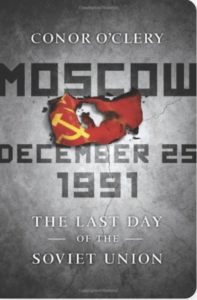
Conor O’Clery’s Moscow 25 December 1991 follows a notably growing trend for picking a pivot point in history and revolving around it to find a popular audience (witness 1066, 1421, 1434, 1491, 1492 etc. All good books by and large but adopting a very similar tact). The date provides a recognizable focus, and then the space is open to give the background and the aftermath in a popular fashion. O’Clery breaks the mould though in a most engaging fashion with the book. I am always in praise of those who can manage to use flashbacks within chronologically driven narratives effectively and still hold the thread. In Moscow, 25 December O’Clery very effectively picks the day that Mikhail Gorbachev signed the legal document dissolving the USSR as his pivot. The day is divided into a series of periods, and as time coverless on the act of signing the paper, the author steps back to the genesis of the two protagonists careers. The careers of Mikhail Gorbachev and Boris Yeltsin lead up to the day, and as time slows as they converge on the act, the intermingling of the storylines converges. The structure and execution of the writing are superb.
This is not to downplay the actual events taking place. The cyclical nature of revolution in Russia (both political and economic) is thoughtfully documented and exposed, and the author takes advantage of a privileged position on the sidelines to highlight much information that didn’t make it above the fold in the West. In my opinion, Gorbachev comes off far worse than Yeltsin in the author’s treatment. I am grateful for this as I feel that western media treatment of him may well have been lately shaped by cultural bias and the politics of the time. Neither of which should surprise. However, it is terrific to have some corrective applied. Nonetheless, one is struck by how much the pettiness and personal animosities can play a huge role in the destiny of a nation (or in this case of nations).
I hung on to the few events that I felt I had a degree of familiarity with, such as the failed 1991 coup and the rise of Vladimir Putin, and O’Clery thankfully fills in some gaping holes. The character treatment of Yeltsin gave much to consider and appreciate how his portrayal by western media as merely and opportunistic drinker misses a huge swath of his character and denies a truer appreciation of his motivations and accomplishments. The contrasting (less than complimentary) portrait of Mikhail Gorbachev surprises me yet provides me with a corrective that illustrates how much a carefully managed public persona might hide simple human frailties. Both warn the reader that we must be more critical consumers of the media — forgive my naive moment here.
Moscow 25 December 1991 his is a gripping read. The pace of the narrative holds you in thrall and the richness of the story envelops—a true pleasure. I was fascinated by much of the detail that I would not have come to appreciate at the time of the events taking place and dismayed that I feel that I was starkly out of touch with the momentous things going on. I am grateful for O’Clery’s work in crafting such a nuanced account and sharing his experiences. Highly recommended!
